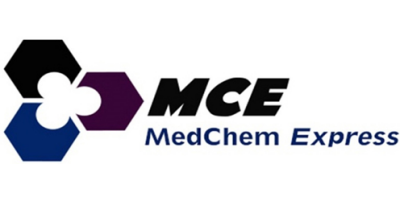

- Home
- Companies
- MedChemExpress LLC (MCE)
- Products
- MedChemExpress - Model Punicic acid - ...
MedChemExpress - Model Punicic acid - 544-72-9
Punicic acid is a bioactive compound of pomegranate seed oil. Punicic acid is an isomer of conjugated α-linolenic acid and ω-5 polyunsaturated fatty acids. Punicic acid has anti-inflammatory and antioxidant activities and can inhibit the expression of inflammatory mediators such as tumor necrosis factor α (TNF-α). Punicic acid can also reduce the formation of β-amyloid deposits and hyperphosphorylation of tau by increasing the expression of GLUT4 protein and inhibiting the overactivation of calpain, and is used to prevent and treat neurodegenerative diseases. In addition, punicic acid also has breast cancer inhibitor properties that depend on lipid peroxidation and PKC pathways[1][2][3][4].MCE products for research use only. We do not sell to patients.
Punicic acid
MCE China:Punicic acid
Brand:MedChemExpress (MCE)
Cat. No.HY-139066
CAS:544-72-9
Synonyms:Trichosanic acid
Purity:98.0%
Storage:Solution, -20°C, 2 years
Shipping:Room temperature in continental US; may vary elsewhere.
Description:Punicic acid is a bioactive compound of pomegranate seed oil. Punicic acid is an isomer of conjugated α-linolenic acid and ω-5 polyunsaturated fatty acids. Punicic acid has anti-inflammatory and antioxidant activities and can inhibit the expression of inflammatory mediators such as tumor necrosis factor α (TNF-α). Punicic acid can also reduce the formation of β-amyloid deposits and hyperphosphorylation of tau by increasing the expression of GLUT4 protein and inhibiting the overactivation of calpain, and is used to prevent and treat neurodegenerative diseases. In addition, punicic acid also has breast cancer inhibitor properties that depend on lipid peroxidation and PKC pathways.
In Vitro:Punicic acid (10 μM, 4 min) inhibits TNF-α induced neutrophil ROS overproduction without affecting fMLP or PMA (HY-18739) induced responses[2]. Punicic acid (0-40 μM, 30 min) reduces TNF-α induced p47phox phosphorylation starting from 10 mM concentration[2]. Punicic acid (10 μM, 30 min) inhibits TNF-α induced NADPH oxidase activation[2]. Punicic acid (0-40 μM; 48 h) exhibits a concentration-dependent antiproliferative effect on MDA-ERα7 and MDA-wt cells[4]. Punicic acid (40 μM; 48 h) induces apoptosis of MDA-ERα7 and MDA-wt cells and increases the percentage of cells in the G2/M phase. The ability to induce apoptosis of MDA-ERα7 and MDA-wt cells is completely blocked in the presence of 20 μM α-tocotrienol (HY-129459)[4]. Punicic acid (5-80 μM; 48 h) is partially blocked in the presence of BIM (4 μM) on MDA-ERα7 and MDA-wt cells[4].
In Vivo:Punicic acid (400 μg, i.g.; once daily for ten days) reduces significantly the TNBS-induced colonic damage in male Wistar rats by demonstrating mild inflammatory infiltration accompanied by punctate mucosal erosions[2].
Hot selling product:Eltrombopag | Copanlisib | Coenzyme A | Topotecan (hydrochloride) | Sorafenib (Tosylate) | 2-Ketoglutaric acid | Clovibactin | Cerivastatin (sodium) | Eganelisib | Ryanodine
Trending products:Recombinant Proteins | Bioactive Screening Libraries | Natural Products | Fluorescent Dye | PROTAC | Isotope-Labeled Compounds | Oligonucleotides
References:
[1]. Shabbir MA, et al. Punicic acid: A striking health substance to combat metabolic syndromes in humans. Lipids Health Dis. 2017;16(1):99. [Content Brief]
[2]. Boussetta T, et al. Punicic acid a conjugated linolenic acid inhibits TNFα-induced neutrophil hyperactivation and protects from experimental colon inflammation in rats[J]. PloS one, 2009, 4(7): e6458. [Content Brief]
[3]. Guerra-Vázquez, et al. Punicic acid and its role in the prevention of neurological disorders: A review. Foods 11.3 (2022): 252. [Content Brief]
[4]. Grossmann, et al. Punicic acid is an ω-5 fatty acid capable of inhibiting breast cancer proliferation. International journal of oncology 36.2 (2010): 421-426. [Content Brief]
Brand introduction:
• MCE (MedChemExpress) has a global exclusive compound library of more than 200 kinds, and we are committed to providing the most comprehensive range of high-quality small molecule active compounds for scientific research customers around the world;
• More than 50,000 highly selective inhibitors and agonists are involved in various popular signaling pathways and disease areas;
• The products cover a variety of recombinant proteins, peptides, commonly used kits, more PROTAC, ADC and other characteristic products, widely used in new drug research and development, life science and other scientific research projects;
• Provide virtual screening, ion channel screening, metabolomics analysis detection analysis, drug screening and other professional technical services;
• It has a professional experimental center and strict quality control and verification system;
• Provide LC/MS, NMR, HPLC, chiral analysis, elemental analysis and other quality inspection reports to ensure the high purity and high quality of products;
• The biological activity of the products has been verified by the experiments of customers in various countries;
• A variety of top journals such as Nature, Cell, Science and pharmaceutical patents have included the scientific research results of MCE customers;
• Our professional team tracks the latest pharmaceutical and life science research and provides you with the latest active compounds in the world;
• It has established long-term cooperation with the world's major pharmaceutical companies and well-known scientific research institutions。
